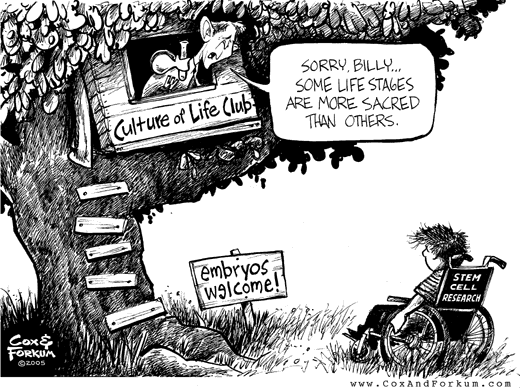I believe that it is more socially acceptable to use embryos that where created for in-vitro fertilization and left over rather than an aborted embryo. Many fertilized eggs are discarded, unwanted, after a few years after being created for in-vitro. However, when discussing this with a good friend of mine, lets call her Amy, she believed that it mattered most if the egg was fertilized outside or inside the body. She thought that if the egg is fertilized outside the body it will not naturally develop any further, but if fertilized inside the body then you are stopping a natural process if the fertilized egg(s) are removed. However, too me an embryo is a group of cells with in the potential to develop into a human whether developed in the body or not. There is such a thing as the adoption of the unborn. Women can "adopt" a fertilized egg that has been left over from other in vitro fertilization cases and carry the embryo to term. The name given to children born through this process is "Snowflake Babies". Even with this option, there are still countless fertilized eggs that are not adopted and simply discarded. Why cant these go towards productive research instead?
In my opinion, I am more concerned with the hundreds of thousands of people dying each year from diseases. People who have any kind of condition which involves the generation of cells have hope of being cured with the further research of embryonic stem cells.
I would also like to note that a professor at our very own UNC Chapel Hill has been awarded as a co-recipient of the Nobel Prize for embryonic stem cell research. Dr. Oliver Smithies, Excellence professor of pathology and laboratory medicine at the University of North Carolina at Chapel Hill School of Medicine, is a co-recipient of this year’s Nobel Prize in physiology or medicine.
The Nobel Foundation today announced that Smithies, along with Mario R. Capecchi of the University of Utah’s Howard Hughes Medical Institute and Sir Martin J. Evans of the United Kingdom, will share this year’s Nobel Prize “for their discoveries of principles for introducing specific gene modifications in mice by the use of embryonic stem cells."

4 comments:
Your blog is very interesting and you are sharing information that is not commonly known about this subject. However, you mentioned that babies born from this process are called Snowflake Babies but why is that? And have you found any information or stories about children who were born as snowflake babies as but did not learn where they came until much later in their life? If you do I think that would be an interesting post because I how those children feel about how they came to be.
I believe that if people are going to discard the fertilized eggs, then they can be given to a good cause, like the research for embryonic stem cells. So I am guess that this research is how you find out what is wrong with the fetus before it is born and then try to fix what is wrong with it? I do not know a lot about this topic so I can't wait for the Analysis post to see the two sides of the argument. I mean if you are going to throw something away like that, then why not give it to science?
Fashionable tree hugger: Thanks you for your support! As far as I have been able to gather, the term "Snowflake Babies" was first formally used by President Bush......Now, this is not to say that I necessarily agree with this term. The first baby was born in 1998 so the concept is still relatively young and many of the kids are probably just starting to realize that in family photos, one is not like the others. Although I applaud anyone who who has such a kind heart as to adopt I do not think that this is on the same level as adopting a child already born as I will explain in my next post!
Healthy lungs: Yes! Embryonic stem cell research will help to identify where things go wrong in cell division and growth and aid in early detection. I also could not agree with you more, why not use stem cells that would otherwise go to waste? Why make scientists clone and harvest and spend millions of dollars finding other was to get their hands on these cells when we have plenty sitting in freezers. Thank you President Bush!
Post a Comment